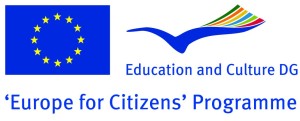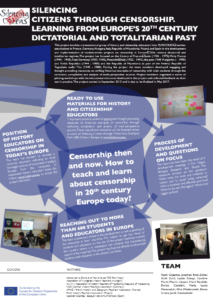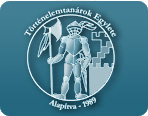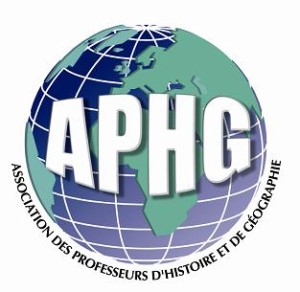Learning from Europe’s 20th-Century Dictatorial & Totalitarian Past
This project involves a transnational group of history and citizenship educators from EuroClio’s member Associations in France, Germany, Hungary, Italy, Macedonia, Poland, and Spain in the development and implementation of students-driven projects on censorship in Europe’s 20th century dictatorial and totalitarian regimes. The focus will be on the history of Franco’s Spain (1936 – 1975), Vichy France (1940 – 1945), Nazi Germany (1933-1945), Mussolini’s Italy (1922 – 1943), the post-1945 Hungarian ( – 1990) and Polish Republics (1944 – 1989) and the Republic of Macedonia as part of the Federal Republic of Yugoslavia under Tito (1945 – 1980). During the project the team members will develop engaging and thought-provoking resources on striking historical examples of censorship with their students through the collection, compilation and analysis of multi-perspective sources. Students with their teacher will then organise local public events such as exhibitions or debates to showcase the cases they researched in a way that questions the resonance of such history today.
Project Aims
[su_list icon=”icon: caret-right”]
- To contribute to citizens’ understanding of the Union, its history and diversity.
- To raise awareness of remembrance, common history and values and the Union’s aim that is to promote peace, its values and the well-being of its peoples by stimulating debate, reflection and development of networks.
Expected Outcomes
[su_list icon=”icon: caret-right”]
- Developing engaging and thought-provoking resources on striking historical examples of censorship with students through the collection, compilation and analysis of multi-perspective sources.
- Studying the concept of censorship in a historical perspective will be an efficient angle to develop students’ critical understanding of the current discussions happening now throughout Europe on freedom of speech and its limits.
- Working transnationally and with a comparative approach will reveal both differences and similarities of national experiences of dictatorship and totalitarianism in Europe, making students reflect creatively on both the relevance and shortcomings of the concept of a European historical memory.
Involved Authors
Vodli Zsolt (Hungarian History Teachers Association), Lazslo Edenyi (Hungarian History Teachers Association), Caroline Morel (French History and Geography Teachers’ Association), Martin Liepach (Association of German History Teachers), Harri Beobide (Basque Network of Schools), Enrico Cavalieri (Parri Institute, Italy), Maria Laura Marescalchi (Parri Institute, Italy), Mire Mladenovski (ANIM – History Teachers’ Association of Macedonia), Bisera Srceva (ANIM – History Teachers’ Association of Macedonia), Jacek Staniszewski (History Teachers’ Association of Poland)
Contributors
Mire Mladenovski, Bisera Srceva, Zsolt Vodli, Laszlo Edentyi, Harri Beobide, Jacek Staniszewski, Caroline Morel, Enrico Cavalieri, Maria Laura Marescalchi, Martin Liepach, Mikel Errazkin
Supported by

The Europe for Citizens Active European Remembrance Action







![[HUNGARY] TTE](https://euroclio.eu/wp-content/uploads/2015/10/HUNGARY-TTE.jpg)
